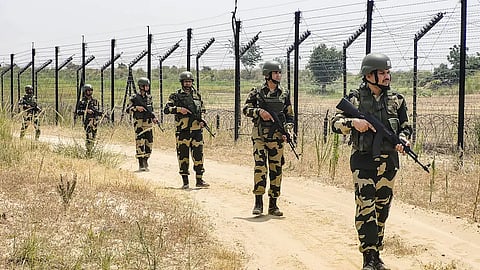
- Home
- Live Blog
- Breaking News
- Top Headlines
- Cities
- NE News
- Sentinel Media
- Sports
- Education
- Jobs

KOKRAJHAR: Observing the possible large-scale migration from Bangladesh to Assam and 6th schedule autonomous council areas after the recent political crisis in Bangladesh, the Bodo National Students’ Union (BONSU) urges the governments of India and Assam to take strict surveillance at the border with Bangladesh to check on the migrants.
On the occasion of ‘International Day, World Indigenous People’ submitted a memorandum to the Chief Minister, Himanta Biswa Sarma, through the District Commissioner, Kokrajhar, demanding strict surveillance and monitoring on the illegal infiltration of migrants from Bangladesh to Assam and the 6th schedule Bodoland Territorial Council.
The president of the BONSU Bonjit Manjil Basumatary and Spokesperson Hem Chandra Brahma said in the memorandum that the political instability and religious persecution in Bangladesh had raised serious concerns about a potential increase in illegal immigration of Bangladeshis in Assam, which shares a long border with Bangladesh. This situation is exacerbated by the fact that the BTC region, under the sixth schedule of the Indian Constitution, is particularly vulnerable to such demographic shifts. The BONSU, through its memorandum, points out that the sixth schedule provides special protections to the tribal communities of Assam and other Northeastern states, aiming to safeguard their cultural, economic, and administrative interests through autonomous councils. The influx of Bangladeshi migrants will pose several threats, like administrative issues and impacts on governance, as well as an increase in non-tribal populations, which could disrupt governance and representation within the tribal councils, potentially undermining the balance of power and the effectiveness of local administration. The student body said the influx of migrants may place additional pressure on tribal lands and resources, leading to disputes and conflicts over land use and ownership; the unique cultural identity and traditions of the tribal communities may face dilution or conflict due to changing demography; there will be increased competition for jobs and resources; and the economic stability of the tribal areas, which are already economically disadvantaged, could alter the political dynamics by demographic shifts affecting the representation and policy priorities within the autonomous councils. They also said the central and state governments might need to revisit and revise the legal frameworks and policies to address the implications of increased immigration in sixth-schedule areas.
The BONSU in response to these challenges, has urged the government of India and Assam to enhance measures to prevent illegal immigration through improved surveillance, patrolling, and technological monitoring, to strengthen the autonomous councils by providing additional support and resources to them to effectively manage local affairs, including land and resource management, to initiate exemption of the Citizenship Amendment Act (CAA) in sixth scheduled councils considering the significant demographic changes due to immigration, to provide more power to BTC or up-grading it to an autonomous state under article 244 (A) of the Indian Constitution to safeguard the tribal communities and their rights, to implement the Comprehensive Identification Systems to verify the status of residents and ensure accurate voter rolls and official records and updating and enforcing legal frameworks to strengthen laws related to citizenship, residency and land ownership for better protection of rights of the tribal people.
Further, the student body urges the government of India to promote economic development by initiating targeted economic programs to uplift tribal communities and address competition for resources, to adopt monitoring and evaluation to establish mechanisms for ongoing assessment of immigration trends and their impacts on tribal areas to inform policy adjustments, and to provide legal assistance and advocacy to help tribal communities.
Also watch: